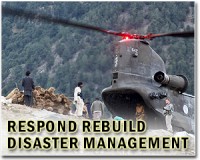 |
West Lafayette IN (SPX) Feb 02, 2011 A Purdue University researcher is proposing development of a new cross-disciplinary approach for analyzing and preventing systemic failures in complex systems that play a role in calamities ranging from huge power blackouts to the BP Deepwater Horizon disaster and the subprime mortgage crisis. "The striking similarities in such catastrophes necessitates a broader perspective to better understand such failures," said Venkat Venkatasubramanian, a professor of chemical engineering. "In the history of systemic failures, a few disasters have served as wake-up calls. The Flixborough chemical plant accident in the United Kingdom in 1974, where a Nypro UK plant explosion killed 26 people, was one such call." Other such major catastrophes, he said, include a 1984 Union Carbide accident in Bhopal, India, which killed more than 2,000 and injured more than 100,000, and the 1988 failure of an oil platform operated by Occidental Petroleum in the North Sea, which resulted in 167 deaths and about $2 billion in losses. "Such systemic failures are not limited to the chemical and petrochemical industries," Venkatasubramanian said. "The Northeast electrical power blackout in 2003 and a recent massive recall of drug products are both systemic failures. Financial disasters such as Enron, WorldCom, the subprime mortgage derivatives crisis and the Madoff Ponzi scam also belong to the same class." The need for a new cross-disciplinary framework to address such systemic failures was introduced in an article appearing in the January 2011 issue of the AIChE Journal. "We must study all disasters from a common systems engineering perspective so that one can thoroughly understand the commonalities as well as the differences in order to better design and control such systems in the future," Venkatasubramanian said. "There is an important role for universities here, as well, in creating and disseminating knowledge about abnormal-events management in complex engineered systems and their public and corporate policy implications." Such studies need to be carried out, he said, with public policy experts so that the scientific and engineering lessons get translated into effective policies and regulations. "Typically, systemic failures occur due to fragility in complex systems," Venkatasubramanian said. "Modern technological advances are creating a rapidly increasing number of complex engineered systems, processes and products, which pose considerable challenges in ensuring their proper design, analysis, control, safety and management for successful operation over their life cycles." The sheer scale and complexity of interactions between elements, including people, in such systems-of-systems make them fragile. "In particular, the nonlinear interactions among a large number of interdependent components and the environment can lead to what we call 'emergent' behavior," Venkatasubramanian said. "In other words, the behavior of the whole is different than the sum of its parts and can be difficult to anticipate and control. This is further compounded by human errors, equipment failures and dysfunctional interactions among components and subsystems that make systemic risks even more likely if one is not vigilant all the time." Postmortem investigations have shown that major disasters rarely occur due to a single failure of equipment or personnel. Instead, layers of failures of equipment, systems, processes, regulations and people usually are at fault, he said. Often, Venkatasubramanian said, the responsibility for an accident rests with the top levels of company management and a poor corporate culture regarding safety. "Professor Venkatasubramanian's article in AIChE discusses the surprising commonalities of systemic failures that lead to disasters, such as the Gulf of Mexico oil spill, and outlines a role that academic institutions can play to prevent such destructive events from happening in the future," said John W. Bickham, director of Purdue's Center for the Environment and a professor in the Department of Forestry and Natural Resources. "The highly interdisciplinary field of systems engineering will play a key role in the development of policies and procedures that can protect the environment and human health and safety in the future."
Share This Article With Planet Earth
Related Links Purdue University Bringing Order To A World Of Disasters A world of storm and tempest When the Earth Quakes
 Australia flags taxpayer levy for floods
Australia flags taxpayer levy for floodsSydney (AFP) Jan 21, 2011 Australian Prime Minister Julia Gillard Friday raised the prospect of a one-off tax to pay for rebuilding after epic floods, as rising waters prompted more evacuations in the southeast. Crops, roads and railway lines were washed away and thousands of homes destroyed by vast floods that swamped Queensland state this month in what the government has said could be the nation's most costly natur ... read more |
|
| The content herein, unless otherwise known to be public domain, are Copyright 1995-2010 - SpaceDaily. AFP and UPI Wire Stories are copyright Agence France-Presse and United Press International. ESA Portal Reports are copyright European Space Agency. All NASA sourced material is public domain. Additional copyrights may apply in whole or part to other bona fide parties. Advertising does not imply endorsement,agreement or approval of any opinions, statements or information provided by SpaceDaily on any Web page published or hosted by SpaceDaily. Privacy Statement |